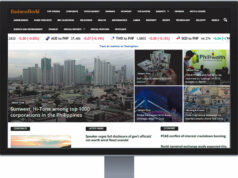Transformation toward sustainability
By Mark Louis F. Ferrolino, Special Features Writer
A BUSINESS-AS-USUAL approach can no longer get the job done. Companies need to recognize sustainability as part of their business model to survive and thrive.
According to Bonar Laureto, executive director of the Philippine Business for the Environment, a non-profit organization that supports sustainability management initiatives, a sustainable company needs to be configured to conduct business ethically, managing the impact of its existence, deliver value to society, and be future-ready.
“For a business to be called sustainable, all of these have to be present. If you’re missing one of these, it will collapse, it can harm your business. If you’re missing corporate governance, for instance, you can go in a certain direction that could bring about your demise. All of these things are non-negotiable. You can’t just talk about sustainability from one lens,” Mr. Laureto told BusinessWorld in an interview.
Over the past decades, several studies have shown that integrating sustainability practices in business operations provide significant benefits. These include a higher chance of attracting investors and engaging talent, according to Mr. Laureto.
Many investors today are using environmental, social and governance (ESG) metrics to evaluate companies in which they might want to invest. These are sets of standards that consider how a certain company performs as a steward of nature, how it manages relationships with its stakeholders, and how it deals with executive pay, audits, internal controls and shareholder rights, among others.
According to global investment manager Schroders, the volume of passive strategies using ESG metrics and exclusions as stand-alone investment criteria has surged in recent years. BlackRock also projects that global ESG exchange-traded fund assets will rise to more than $400 billion by 2028 from $25 billion in 2018.
Meanwhile, companies that focus on sustainability practices are also believed to have better employee engagement, as validated by several studies. A survey by a blockchain-based clean energy platform Swytch, for instance, revealed that employees of all generations seek companies that have programs set in place to be more sustainable.
In terms of employee retention, the survey showed that nearly 70% of the respondents believe that a strong sustainability plan will affect their decision to stay with a company for the long term. In fact, about 30% have left a company due to its lack of a corporate sustainability agenda.
“Globally, those companies that are publishing sustainability reports are actually increasing over the years. A lot of companies are making these data available because it’s about attracting the right investors and the right talent,” Mr. Laureto said.
In the Philippines, the Securities and Exchange Commission (SEC) now requires publicly-listed companies (PLCs) to submit their sustainability reports starting next year.
With the issuance of the Sustainability Reporting Guidelines, the SEC, according to its Chairperson Emilio B. Aquino, has high hopes that PLCs will be made aware of sustainability and make it a part of their priorities.
Mr. Laureto said this measure should not be perceived as an additional reporting burden. “[If] you want to succeed in the Philippine market, [if you] want your company more competitive, you disclose your ESG performance because investors are looking for these,” he said.
THE EPITOME OF SUSTAINABLE BUSINESS
A Filipino company that actively embodies sustainable practices in its operations is Energy Development Corp. (EDC), a world leader in geothermal technology and the country’s largest 100% renewable energy company. EDC has a long history of pioneering sustainable practices, and is committed to improving people’s lives by ensuring that its businesses grow, along with the environment, its employees, and other stakeholders.
Last year, EDC generated economic value of P40.8 billion, with 58% or P23.7 billion distributed to the economy through operating spending, employee wages and benefits, payments to capital providers, taxes, and community investment.
To manage and reduce the environmental impact of its operations, EDC continues to monitor and manage its greenhouse gas emissions and other significant air pollutants, as well as its waste generation and water withdrawal. Through one of its environmental stewardship programs, BINHI Greening Legacy, EDC was able to restore denuded forests, identify, collect and start propagating 96 threatened native tree species, and protect biodiversity.
This initiative captures 3.96 million tons of carbon dioxide each year, and EDC’s effective emissions management mechanisms, has allowed the company to maintain its carbon-negative status, one that absorbs and sequesters more carbon than it produces based on the Intergovernmental Panel on Climate Change’s (IPCC) norms.
Apart from caring for the environment, EDC has likewise implemented several corporate social responsibility (CSR) programs which aim to empower various stakeholders and partner communities toward becoming proactive agents of their own development. Every year, EDC’s strategic CSR programs benefit around 44,496 individuals from 20,000 households in 47 primary partner barangays across all areas where it operates.
The company also aligns its efforts with the Sustainable Development Goals (SDGs) of the United Nations as a general framework to end poverty, protect the planet, and achieve prosperity for all. EDC’s primary focus has always been to ensure access to affordable, reliable, sustainable, and modern energy for all (SDG 7). In the process, the company has also been promoting gender equality (SDG 5); decent work and economic growth (SDG 8); industry, innovation, and infrastructure (SDG 9); responsible consumption and production (SDG 12); climate action (SDG 13); and life on land (SDG 15).
Through its various CSR efforts, EDC, on the other hand, has been contributing to the fight against hunger and poverty (SDGs 1-2); ensuring access to clean water and sanitation (SDG 6); enhancing good health and well-being (SDG 3); and providing access to quality education without discrimination (SDG 4).
However, the company’s journey to being sustainable doesn’t end here. As Mr. Laureto said, sustainability is not a point but a journey.
“There’s no such thing as a sustainable state because a sustainable business model means a company that continually improves on its sustainability performance,” he said. “It will never end.”
EDC said it strives to keep finding ways to provide clean, renewable, reliable power through the geothermal energy it has been specializing in for almost 40 years, and works to also enhance its impact on the environment and on the communities that it serves.
DRIVING FORCES LEADING THE WAY TO SUSTAINABILITY
More and more companies are making the leap to operate in a more sustainable way; it is fast becoming a strategic imperative rather than an option.
The increasing threat of climate change is pushing companies to transition away from business as usual. As Mr. Laureto said, the public is more critical about what firms are doing because it suffers the consequences in the form of more severe natural hazards caused by changing climate.
“In the past, being a good businessman was easier. You just have to sell the products to your customers, get paid for it, make profits, and do the cycle again. Nobody cared about whether you were polluting the river, whether you have so many plastic wrappers and packaging going into the ocean, nobody cared about that. [But] the world today has changed. The stakeholders are very much informed that if you do something bad to the environment or to the stakeholders, social media will pick up, [and] it will destroy you,” Mr. Laureto said.
According to EDC, if carbon emissions are not curbed, 74% of the world’s population and 47% of its land area will be exposed to lethal temperatures by 2100.
“With every passing year, it’s becoming increasingly tougher to deny that our climate is changing faster than previously imagined due to human activity,” EDC Chairman and CEO Federico R. Lopez said in the company’s 2018 Performance Report.
He noted that human activity is warming the Earth 5,000 times faster than the most rapid natural warming occurrence in the past, and species are going extinct faster than at any period in geologic history.
“We urgently need to overhaul how we relate with the Earth if we want to keep it habitable for humans in the decades to come. We don’t have a choice,” Mr. Lopez said.
In addition to climate change, other forces that are driving companies to incorporate sustainability as part of their strategy, as identified by Mr. Laureto, include the entry of younger generations into the workforce demanding corporate sustainability, the growing number of investors who use ESG metrics, the increasing resource scarcity, and the enactment of some government regulations that affect how businesses operate.
INDUSTRY 4.0 AS ENABLER OF SUSTAINABLE DEVELOPMENT
Now that the most recent industrial age, better known as Industry 4.0, is starting to unfold, emerging opportunities toward sustainable development and sustainability are being identified.
“There’s a lot of application to how enterprises can become sustainable with the application of technology brought by Industry 4.0,” Mr. Laureto said.
In agriculture, for instance, Internet of Things (IoT) solutions can help farmers enhance productivity and efficiency. With the help of sensors, farmers can determine what parts of the land have poor nutrients and identify which type of fertilizer they should apply.
“That reduces the cost of the farmers, and it absolutely could increase productivity,” Mr. Laureto said. “Less expense, less environmental impact.”
Mr. Laureto also said the application of technologies brought about by Industry 4.0 is not limited to enhancing sustainable operations across diverse industries but also in addressing key social issues, including poverty, hunger, and access to clean water and health care services.
Despite the benefits of being a sustainable business, some firms are still reluctant to make strong commitments to sustainability. One main reason for this, according to Mr. Laureto, is that it comes with upfront costs.
“The perspective of sustainability as a cost rather sustainability as an investment is one of the biggest barriers,” he said. “There’s an upfront cost to it, unless the managers see it through a long-term point of view.”
The existence of some government policies and regulations also restrict firms from embracing sustainability practices. Citing an example, Mr. Laureto said: “Companies want to minimize the use of packaging in general by putting up refilling stations, [but] FDA (Food and Drug Administration) has a policy against refilling.”
“The objective of reducing waste and the investment that the company will make is hindered by the policy,” he added.
In this case, the government, he said, should create an enabling policy which will remove the barriers that prevent companies from incorporating sustainable practices in their operations.
“Enabling policy is critical so that private sector can come in. Government doesn’t have to do anything for the private sector, except that they make doing business easy and they enable them to come in, enable them to invest, remove the barriers,” Mr. Laureto said.
By and large, sustainability is not only a matter of strategy for businesses to stay relevant and achieve long-term growth — it is for everyone — to improve the life of every member of society. As Mr. Laureto puts it: There’s no economy to speak about without sustainable development.
“Our economic activities and the things that we do are highly dependent on maintaining natural capital and ensuring that resources are used wisely,” he said.



